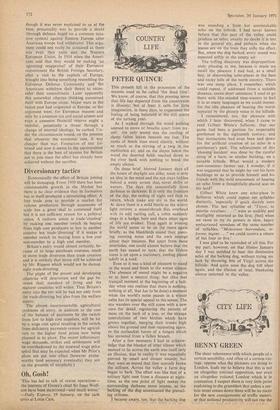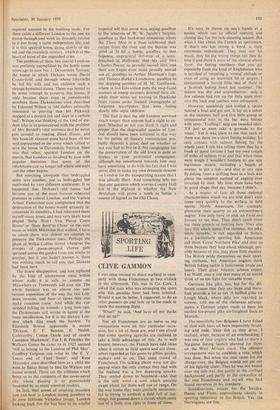BENNY GREEN
The sheer vehemence with which people of a certain sensibility, and often of a certain vin- tage, oppose what the planners are doing to London, leads me to believe that this is not an altogether rational opposition, nor even an altogether rational London which is in contention. I suspect there is very little point explaining to the grumblers that unless a cer- tain street comes down there will be no room for the new consignments of traffic meters, or that national productivity will not rise the required amount in the building trade. For there exists a different London to the one we tramp through and work in, distantly related to it but living a quite independent life, and it is this spectral town, dying slowly of dry rot and the twentieth century, which is at the heart of most of the anguished cries.
The problem of these two coeval Londons was perfectly exemplified by the battle some years ago to save No. I, Devonshire Terrace, the house in which Dickens wrote David Copperfield, and through whose labyrinths he led his wife and ten children such a strange hysterical dance. There was bound to be some attempt to preserve this house, if only because there exist in considerable numbers those Dickensians once described by Edmund Wilson as 'old duffers primarily interested in proving that Mr Pickwick stopped at a certain inn and slept in a certain bed'. Wilson was thinking of the kind of stu- dent who is so preoccupied with the problem of Mrs Bardell's vital statistics that he never gets around to reading Bleak House, and this bookish element must have been all too well represented in the army which rallied to save the house in Devonshire Terrace. Here was that other, spectral London on the march. that London so involved by now with popular literature that some of the inhabitants can no longer tell where one ends and the other begins.
But marching alongside that bedraggled army was another, just as bedraggled but motivated by very different sentiments. It so happened that Dickens's old house had become one of the most famous rehearsal premises in central London, and the Variety Artists' Federation now complained that the destruction of the house would seriously in- commode its members. I had rehearsed there myself many times, and may very likely have played 'Baby Won't You Please Come Home' or 'Slow Boat' to China' in the very room in N% hich Micawber first walked. I have to admit there was almost no attempt to preserve the Dickensian aura. Perhaps the ghost of Wilkie Collins stirred whenever the troupes of goose-pimpled chorus girls sprinted across the garden from one studio to another, but if you hadn't known it, there was nothing much to tell you that Dickens had been here.
The house disappeared, and was replaced by the kind of anonymous mess within whose walls it is safe to assume no Micawbers or Trotwoods will ever stir. The whole business was an almost too con- venient exposition of the way the two Lon- dons co-exist, and how at times they can make common cause. And while the VAF stopped licking its wounds a long time ago, the Dickensians still writhe in agony at the mere recollection, for it is the literary Lon- don which dies much the hardest. To Elizabeth Bowen apparently it means 'Dickens, E. F. Benson, E. Nesbit, Galsworthy, Conan Doyle and of course Compton Mackenzie'. For J. B. Priestley the Walham Green he came to in 1922 seemed 'still to belong to the London of Phil May'. Geoffrey Grigson can refer to 'the E. V. Lucas end of Fleet Street', and Rose Macaulay once described how as a child she went to Baker Street to find Dr Watson and found several. These are the attitudes which bring us to the ramparts of the never-never city whose passing is so passionately lamented by so many constant readers.
In fact, that sound of crashing masonry you can hear is London saying goodbye to „its own fictitious Victorian image, London looking back for the last time to its wistful
imperial self that never was, saying goodbye to the wharves of W. W. Jacobs's bargees, goodbye to that backstreet restaurant where the ,Three Men in a Boat celebrated their escape from the river and the Beaune was good at 3s 6d a bottle, goodbye to that hopeless, impractical dirt-trap of a semi- detached in Holloway that Mr and Mrs Charles Pouter so•proudly moved into, and their son Lupin even more proudly moved out of. goodbye to Arthur Morrison's Jago and Thomas Burke's Limehouse, goodbye to the shipping parishes of H. M. Tomlinson, where in lost Edwardian pubs the map-faced masters of tramp steamers downed their ale. while their wives sat waiting in Dockland front rooms under framed photographs of forgotten tea-clippers that were fading slowly into sepia oblivion.
The fact is that the old London survived much longer than anyone had a right to ex- pect. Whether or not you think it right and proper that the disgraceful squalor of Lon- don should have been softened in this way by its patina of literary romanticism pro- bably depends a great deal on whether or not you had to live in it. No campaigner for the preservation of the old town is quite so tireless as your provincial campaigner, although my resentment towards him may have something to do with the fact that I was never able to make my own dramatic descent on London for thc exasperating reason that I was already there. And something tells me that one question which worries County Hall not in the slightest is whether the New Brutalism will prove a tenth as fertile a source of legend as the Old Chaos.


































 Previous page
Previous page